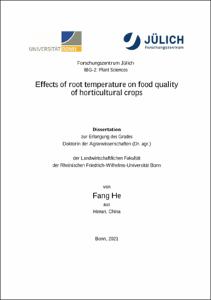Effects of root temperature on food quality of horticultural crops

Effects of root temperature on food quality of horticultural crops

| dc.contributor.advisor | Watt, Michelle | |
| dc.contributor.author | He, Fang | |
| dc.date.accessioned | 2021-10-14T13:52:59Z | |
| dc.date.available | 2021-10-14T13:52:59Z | |
| dc.date.issued | 14.10.2021 | |
| dc.identifier.uri | https://hdl.handle.net/20.500.11811/9361 | |
| dc.description.abstract | Different from ambient temperature, root temperature is convenient and economical to manage and control, especially with the development of greenhouse. Understanding the effects of root temperature on plant growth and key food components of horticultural crops under greenhouse conditions is important because of its high economic interest. In Chapter 2, 3 and 4, growth and food quality (sugar, antioxidants and minerals) of cocktail tomato (Lycopersicon esculentum cv “Amoroso” and cv “Delioso”) and Chinese broccoli (Brassica oleracea var. alboglabra cv “Cuimei”) under different root temperature treatments were investigated.
For cocktail tomatoes, reductions of marketable yield per plant in both cultivars were observed in response to root cooling (10°C) in winter, but not significantly in summer, compared to control group (16-27°C). In most cases, root cooling had a positive effect on the sensory and nutritional quality (sugars, vitamin C and carotenoids levels) of cocktail tomatoes. Specifically, 'Delioso' showed an increase in glucose, vitamin C and lycopene concentration of the fruits after root cooling in both seasons, while 'Amoroso' exhibited only higher consistent values in glucose levels. For Chinese broccoli, low root temperature (10 and 15°C) was in general associated with a higher concentration of soluble sugars, total chlorophyll and glucosinolates, but lower mineral levels in stems and leaves than the control group (20°C), regardless of the treatment duration. The yield was reduced with root cooling, but shortening the cooling treatment alleviated this reduction, especially in summer. Manipulation of root temperature could be a feasible method to improve the overall food quality of cocktail tomatoes and Chinese broccoli. However, this effect is dependent on cultivars and other environmental factors. | en |
| dc.language.iso | eng | |
| dc.rights | In Copyright | |
| dc.rights.uri | http://rightsstatements.org/vocab/InC/1.0/ | |
| dc.subject | Wurzeltemperatur | |
| dc.subject | Pflanzenwachstum | |
| dc.subject | Cocktailtomaten | |
| dc.subject | Chinesischer Brokkoli | |
| dc.subject | Mineralien | |
| dc.subject | Antioxidantien | |
| dc.subject | greenhouse experiments | |
| dc.subject | hydroponic | |
| dc.subject | cocktail tomato | |
| dc.subject | Chinese broccoli | |
| dc.subject | glucosinoaltes | |
| dc.subject | lycopene | |
| dc.subject | beta-carotene | |
| dc.subject | fructose | |
| dc.subject | glucose | |
| dc.subject | antioxidant | |
| dc.subject | root cooling | |
| dc.subject.ddc | 630 Landwirtschaft, Veterinärmedizin | |
| dc.title | Effects of root temperature on food quality of horticultural crops | |
| dc.type | Dissertation oder Habilitation | |
| dc.publisher.name | Universitäts- und Landesbibliothek Bonn | |
| dc.publisher.location | Bonn | |
| dc.rights.accessRights | openAccess | |
| dc.identifier.urn | https://nbn-resolving.org/urn:nbn:de:hbz:5-62539 | |
| ulbbn.pubtype | Erstveröffentlichung | |
| ulbbnediss.affiliation.name | Rheinische Friedrich-Wilhelms-Universität Bonn | |
| ulbbnediss.affiliation.location | Bonn | |
| ulbbnediss.thesis.level | Dissertation | |
| ulbbnediss.dissID | 6253 | |
| ulbbnediss.date.accepted | 27.04.2021 | |
| ulbbnediss.institute.other | Forschungszentrum Jülich / IBG-2: Plant Sciences | |
| ulbbnediss.fakultaet | Landwirtschaftliche Fakultät | |
| dc.contributor.coReferee | Pude, Ralf | |
| ulbbnediss.contributor.gnd | 1246795752 |
Files in this item
This item appears in the following Collection(s)
-
E-Dissertationen (1116)




